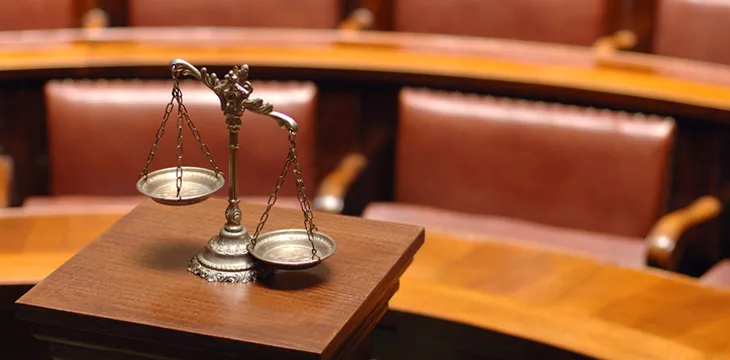|
Getting your Trinity Audio player ready...
|
Tornado Cash users are fighting to overturn sanctions imposed by the Treasury’s Office of Foreign Assets Control (OFAC) over the mixer, arguing that Tornado Cash is incapable of qualifying as ‘property in which a foreign national has an interest’ as required by the U.S. International Emergency Economic Powers Act (IEEPA) governing sanctions imposition.
The case raises the question of whether decentralized autonomous organizations (DAOs)—such as Tornado Cash—can be the subject of a sanctions order in the United States.
The Treasury has argued in the case that Tornado Cash is ‘a group of individuals who are organized to act in concert, in service of operating, promoting and updating their mixing service for anonymous digital currency transactions’ and therefore amounts to an unincorporated association, which meets the definition of a ‘national’ as required by the IEEPA.
However, the plaintiffs argue that this description of Tornado Cash is inconsistent with the entity actually designated by the Treasury in its sanctions order, which described Tornado Cash as the 1.5 million holders of the project’s TORN tokens.
“There is nothing in the record to suggest that those token-holders have combined to execute the supposed ‘common purpose’ of operating, promoting, or updating the Tornado Cash privacy protocol,” they said. “At its core, merely possessing TORN demonstrates nothing about the holder’s purpose.”
The plaintiffs also argue that the ‘property’ being sanctioned amounts to nothing more than smart contracts and, therefore, cannot be the subject of Treasury sanctions.
“The Department has failed to explain how the immutable, open-source smart contracts listed in the designation—which no one can own or control—are sanctionable ‘property,’” reads the filing in support of the Tornado Cash users’ motion for summary judgment.
“The requirement of ‘property’ is central to the IEEPA, not a loophole. If Congress wishes to expand IEEPA to authorize the regulation of ownerless software, it may do so. Because the immutable smart contracts are not ‘property,’ they cannot be the target of a statute explicitly directed at ‘property’ and ‘interests in property.’”
Tornado cash
The case—backed by Coinbase (NASDAQ: COIN)—was launched by six Tornado Cash users (including two Coinbase employees) in August.
The six users allege that OFAC’s blacklisting of the Tornado Cash website, together with wallets allegedly associated with the service, “exceeds [OFAC’s] statutory authority, infringes on the plaintiff’s constitutional rights, and threatens the ability of law-abiding Americans to engage freely and privately in financial transactions.”
On that basis, the plaintiffs are asking the court to declare OFAC’s decision null and void.
The lawsuit came hot on the heels of the Treasury’s decision to impose sanctions on Tornado Cash for allegedly allowing hackers to launder $7 billion worth of digital assets since 2019. Tornado Cash’s founder, Alexey Pertsev, was arrested on money laundering charges in the Netherlands shortly after the sanctions were announced.
It’s one of a number of legal actions which have sought to rely on a digital asset project’s status as a ‘DAO’—or decentralized autonomous organization—to evade liability.
In 2022, a U.S. court granted permission to the Commodity Futures Exchange Commission to serve a lawsuit upon a OokiDAO via its online chatbox. The case drew much industry commentary, particularly from decentralized finance (DeFi) interest groups who argued that allowing service in that way would ‘chill’ the burgeoning decentralized governance movement. The court agreed with the CFTC’s contention that service via the chatbox was necessary because, by nature, DAOs have no headquarters, physical offices, or registered addresses.
Illustrating the problem DAOs may pose to effective legal enforcement, the OokiDAO appeared to have been formed solely so that its founders could escape the regulatory clampdown on the digital asset industry, which has taken shape over the past couple of years. In establishing OokiDAO, one of its founders was recorded as saying:
“So many people across the industry right now are getting legal notices, and lawmakers are trying to decide whether they want DeFi companies to register as virtual asset service providers or not—and really, what we’re going to do is take all the steps possible to make sure that when regulators ask us to comply, that we have nothing we can really do because we’ve given it all to the community.”
As the Commodity Futures Trading Commission (CFTC) put it—and as the court agreed: “The [founders] were wrong, however. DAOs are not immune from enforcement and may not violate the law with impunity.”
Follow CoinGeek’s Crypto Crime Cartel series, which delves into the stream of groups—from BitMEX to Binance, Bitcoin.com, Blockstream, ShapeShift, Coinbase, Ripple,
Ethereum, FTX and Tether—who have co-opted the digital asset revolution and turned the industry into a minefield for naïve (and even experienced) players in the market.

 08-08-2025
08-08-2025 





